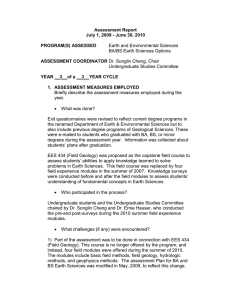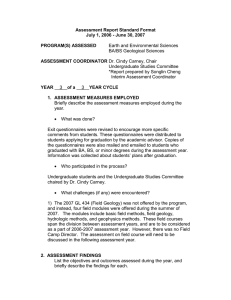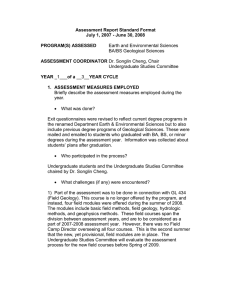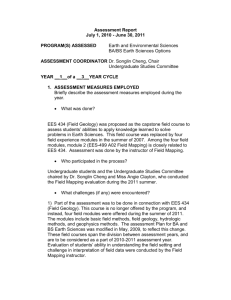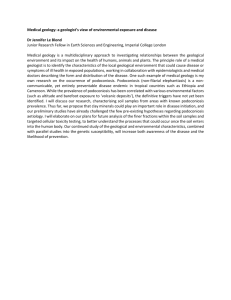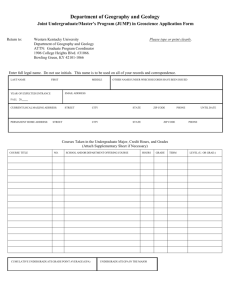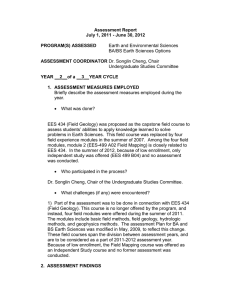Earth Environmental Sciences, (B.A./B.S.)
advertisement
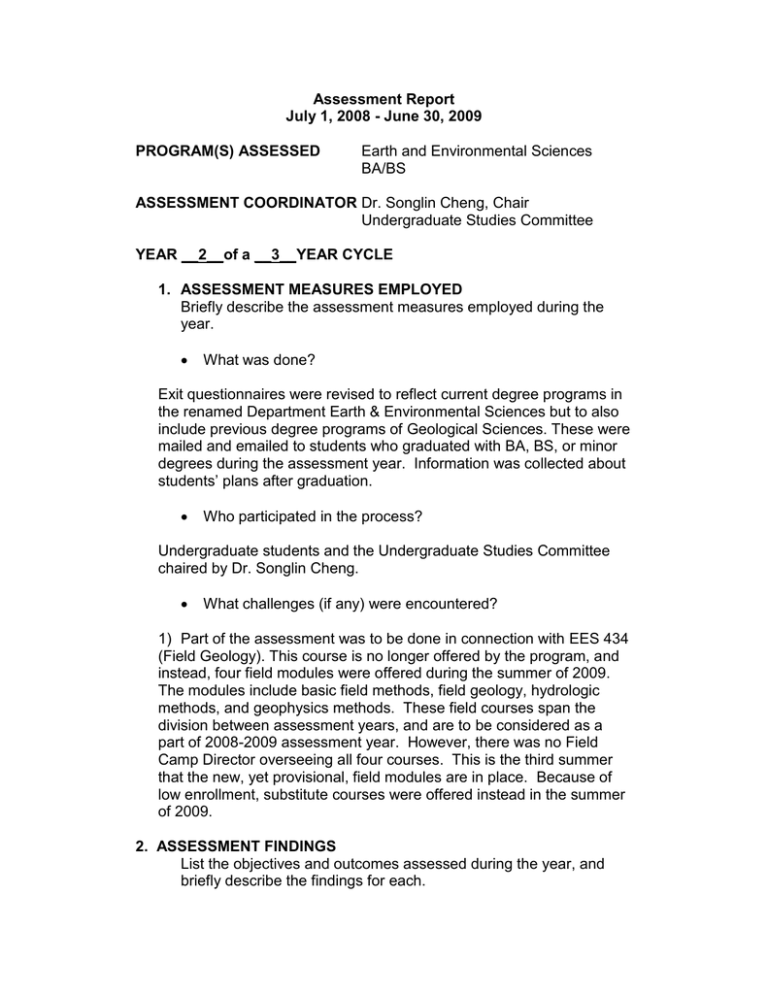
Assessment Report July 1, 2008 - June 30, 2009 PROGRAM(S) ASSESSED Earth and Environmental Sciences BA/BS ASSESSMENT COORDINATOR Dr. Songlin Cheng, Chair Undergraduate Studies Committee YEAR __2__of a __3__YEAR CYCLE 1. ASSESSMENT MEASURES EMPLOYED Briefly describe the assessment measures employed during the year. What was done? Exit questionnaires were revised to reflect current degree programs in the renamed Department Earth & Environmental Sciences but to also include previous degree programs of Geological Sciences. These were mailed and emailed to students who graduated with BA, BS, or minor degrees during the assessment year. Information was collected about students’ plans after graduation. Who participated in the process? Undergraduate students and the Undergraduate Studies Committee chaired by Dr. Songlin Cheng. What challenges (if any) were encountered? 1) Part of the assessment was to be done in connection with EES 434 (Field Geology). This course is no longer offered by the program, and instead, four field modules were offered during the summer of 2009. The modules include basic field methods, field geology, hydrologic methods, and geophysics methods. These field courses span the division between assessment years, and are to be considered as a part of 2008-2009 assessment year. However, there was no Field Camp Director overseeing all four courses. This is the third summer that the new, yet provisional, field modules are in place. Because of low enrollment, substitute courses were offered instead in the summer of 2009. 2. ASSESSMENT FINDINGS List the objectives and outcomes assessed during the year, and briefly describe the findings for each. Program Objectives BA/BS Earth Sciences: Graduates will obtain positions as practicing geoscience professionals, or pursue a graduate degree in Earth Sciences or related fields. Findings: Eight students graduated with either a BS or BA in Geological Sciences or Earth Sciences. Two of these students are currently graduate students in the Earth and Environmental Sciences Department at Wright State University. One is working toward his Master of Education degree at WSU. One is on active duty with US Army. One student is working for IT industry on computer programming project. One graduate is a pre-K teacher and planning to pursue a MS degree in special education. Two students’ current carrier goals are not yet known. Learning Outcomes BA/BS Earth Sciences Option: Outcome 1: Students will acquire the knowledge to understand fundamental concepts of earth sciences and be able to solve problems applying that knowledge. Outcome 2: Students will master fundamental field techniques necessary to the solution of geological problems. Outcome 3: Students will demonstrate the ability to write in a style consistent with that found in a scientific journal. Findings: Outcome 1: Two graduates are currently enrolled in graduate programs in Earth Sciences, and one in Science Education, at Wright State University, which demonstrates that the graduates have acquired the geological knowledge needed for problem solving in geological sciences. Outcome 2 & 3: The coordinator was unable to find outcomes related to # 2 & #3. However, among the eight graduates, seven finished WSU Field Modules in the summer of 2008 and one finished courses that substituted for the field modules in 2009. Responses to Exit Questionnaires: Two students returned the exit questionnaire. Both strongly agreed with the statements that the BS/BA program enhanced their understanding of geological research and enhanced their appreciation of the value of the geosciences. The students indicated that they had attained the skills necessary to communicate their knowledge and research. Both strongly agreed or agreed with the statement that they can frame a scientific question and describe the research that would be needed to answer that question. Both agree with the statement that they are able to apply their expertise to the solution of environmental and geological problems if pursuing a geosciences career. 3. PROGRAM IMPROVEMENTS List planned or actual changes (if any) to curriculum, teaching methods, facilities, or services that are in response to the assessment findings. The field modules approach to replace Summer Field camp is still provisional. With the cancelation of some of the field modules in 2009 due to low enrollment, we are continuing on the final revision/decision of the field modules. 4. ASSESSMENT PLAN COMPLIANCE Explain deviations from the plan (if any). EES434 (Field Geology) was proposed as a capstone course for the BA/BS program in Earth Sciences. Because of the change from field geology to multiple field modules, the assessment plan needs to be modified to include this change. 5. NEW ASSESSMENT DEVELOPMENTS Describe developments (if any) regarding assessment measures, communication, faculty or staff involvement, benchmarking, or other assessment variables. During the Summer Quarter of 2006, the Geological Sciences Department was combined with the Institute of Environmental Quality and renamed the Earth and Environmental Sciences Department. We are continuing to evaluate our undergraduate programs in light of new directions the department will be taking over the next few years. We will likely be making substantive changes to our undergraduate curriculum especially in the number of programs offered at the undergraduate level and in the field experience. This impacts directly on our future assessment plans. We may be required to modify the timing of application of the Knowledge Survey currently associated with field camp. It may be necessary to link the survey to a different capstone course or to additional field experience courses. The Undergraduate Studies Committee will develop a targeted alumni survey to assess past performance and solicit ideas for the new department.
